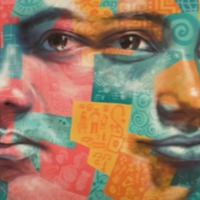
After the attack on [. . .] they passed the night at [the interviewee's home village] ... but not in the town ... They slept in the bush somewhere. Then they just burst in upon us. They locked a lot of us up in one room [of a house] and discussed what to do. Some wanted to kill us all by burning the house. Others said, 'No, it will be hard for us to carry all the loads,' so they took us. They took me and I had to leave my wife behind. I never knew that they had burnt my house.
We walked for six days, with the Sisters [expatriate nuns held hostage in the raid] until we reached the Malal hills. We were three months there. Then we left the Sisters there. We went next [with a group of rebels] to Makondu ... It is in the Yonibana area, inside the bolilands. How we struggled with the loads . . . They would beat us repeatedly.
It was a small place for training, inside the grassland. Then, once [the trainees] had learnt, they would go round and attack [various places]. I did not follow them [on operations] but remained in the camp. I was thinking about my wife. Some of my [abducted] brothers tried to escape.
At times the rebels would tell us, 'Your companion has escaped', but really they were putting them at the front of the attack [to spring any ambushes] and the Sierra Leone soldiers killed them in fighting.
When God wanted to help us the group was engaged in attacking Njala [December 1995]. It was there we escaped. [The group] was trying to change its base location [in the Njala area] and some of the group moved up towards the Sierra Rutile mining area. The ones left behind ran into an ambush of government soldiers around Njala. [Three of us] had been left behind in camp [sick]. That was when we were able to escape. We were ten days in the bush [on the run], and then on day 11 we came out at Lunsar. [Government soldiers] held us and interviewed us. They gave us a letter [of safe conduct] and found transport for us to go home.
That was around the time the rebels came back [to this area] to attack Rokupr. I reported to the police chief, who took my statement. The people filled up the garage [in .. .] to try and see me, but I had to go and hide because I was unable to talk.
Nobody offered any help, except for the letter that [RSLMF] Lieutenant Bangura wrote for me at Lunsar; he also found me a pair of trousers. There was nothing left at home when I returned. Formerly my wife had gone up and down with groundnuts [for sale] but now there was nothing because the rebels had burnt all our property. I was ill [from the load-carrying and constant beatings] and really wanted to rest and get well. But I have no help now [the wife has gone] so there is nothing for it but to try and do some light farm work. I have constant chest pain from where they beat me.
When they trained them they didn't tell them much except that they were fighting for the right to control the country.
[Did you ever meet Foday Sankoh?]
No, never.
When I was first ill from the beating I had on the march some said they should kill me, but others said, no, it would be better if they trained me. But the sickness came back and I was not able to fight. So they left me in the camp. That is why I was able to escape, along with two others, when the attack on Njala failed.
Narrative 9 from Krijn Peters and Paul Richards, “Why We Fight: Voices of Youth Combatants in Sierra Leone”, Source Africa: Journal of the International African Institute, Vol. 68, No.2 (1998): 183-210.









